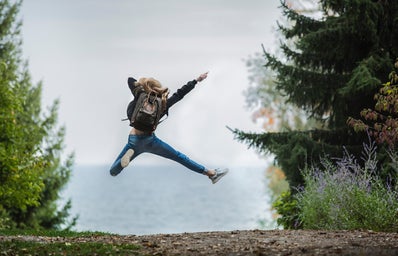I thought this challenge would be pretty easy, as I consider myself and my lifestyle pretty waste-conscious. But on Sunday night, I realised that I didn’t have any milk, fruit, or anything to make lunch for my day at university and planned to fork out on a classic Boots meal deal.
Then, after some shower thinking, I realised how much plastic this all required. Milk comes in plastic cartons, fruit is packaged in plastic bags, and all of the items on the Boots meal deal aisle come in plastic packaging too. It’s gonna be a pretty hard, if not expensive, week.
Monday
I avoided the Boots meal deal and had to get lunch from Portland 59 as, in my mind, the fresher the food, the less packaging it comes in.
As for food shopping, the best I could do to avoid buying plastic was carrying my groceries in a torn paper bag from Dominos – the ones they were giving out in Portland with free pizza…
Cradling my Lidl shopping in my arms like a baby on the way back to my flat, I realised how impossible it was to shop without plastic. Everything I had bought was packaged in plastic in one way or another and there were very little options to help me avoid it.
Tuesday
The sheer amount of plastic I had accumulated from a single groceries shop motivated me to explore methods of shopping with less plastic, and whether or not the plastics that are being used in supermarkets are actually recyclable.
My Google search revealed that, while a healthy 75% of plastic bottles are being recycled, the main concern is the flimsy type of plastic (e.g. stretch wrap over a box of mushrooms) that is expensive and complex to recycle. The flimsy nature of it means that it can get tangled up in machinery at sorting plants and most household collections won’t except it. Recycling these sorts of plastics mostly depends on the local council and whether or not they have the funds to afford and upkeep the machinery.
The bad news is that Nottingham City Council is one of the 80% of councils that currently don’t allow plastic films to be recycled. They do however allow food pots and tubs, margarine tubs, plastic trays and yoghurt pots to be recycled, which is certainly a step forward.
You can find out what your local recycling point recycles here: https://www.recyclenow.com/local-recycling
Wednesday
Unfortunately, I had made an order on Forever 21 before I started this 5-day challenge, and consequently dealt with a load of plastic packaging that couldn’t be helped. This made me realise how environmentally damaging even shopping for clothes could be. However, I’ve noticed that some shops make an effort to use less plastic in their delivery orders, for example, The Body Shop, Origins and even Superdrug. Although the packaging of products itself usually is plastic, plastic bottles are easier to recycle than plastic film/bags.
Friday
It’s the last day of the challenge and I’m not sure I can say I did very well. Amongst other seriously crazy things that I saw in Ocean (including my shoe sticking to the floor so much it fell off), I witnessed a crazy amount of plastic bottles being carried away in clear plastic bags – hopefully a sign that they’ll be recycled?
(please don’t ask me how many times it took my not-so-sober fingers to take this photo)
But I think Ocean can take a hint from other clubs and start using plastic reusable cups, instead of buying more disposable ones.
Conclusion
I’m definitely not as environmentally conscious as I thought, and I think most people would agree with me. After some research on the different ways I can shop to reduce waste, I’ve found that most suggested ways of being more environmentally conscious are time-consuming, expensive and difficult. (A similar experiment by the Guardian earlier this year agrees with me.) Websites like Greenpeace suggest to go vegan (not for everyone), shop at places that don’t use plastic packaging (very rare and usually more expensive), and to get your milk delivered in glass bottles.
Good environmental practice requires us to completely adjust the way we use some essential items, which can be difficult. It’s the harsh truth. And until recycling plastic becomes easier or more readily available, a reduced plastic life will require a complete change in habits for the majority of people.
Edited By Niamh Perry
References
http://www.bpf.co.uk/packaging/recycling.aspx
https://www.theguardian.com/money/2017/may/27/cut-plastic-weekly-shop-family

